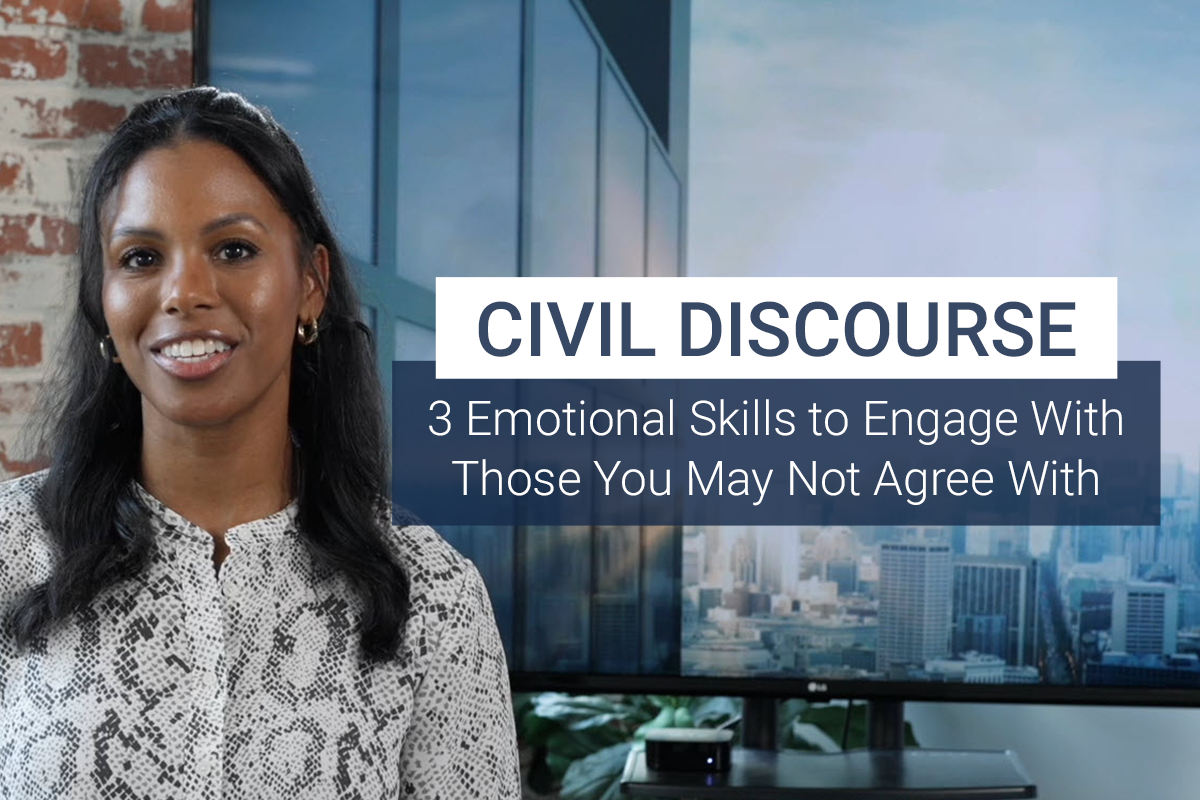Most of us are familiar with the dynamic cartoon duo Road Runner and Wile E Coyote. Famous for their contemptuous relationship, they are a great example of how not to interact with other people.
But, in all seriousness, it matters how you treat people, even if you disagree with them. Civil Discourse is not mere politeness. It’s the art of engaging our differences more constructively through empathy and curiosity. It’s not just sharing your own views, but it’s opening up conversations on difficult topics instead of shutting them down and committing to carefully listen to understand another person.
According to the National Institute for Civil Discourse at the University of Arizona, 94% of Americans believe that we have a civility problem. 75% of Americans believe it’s at a crisis level.
The basic focus of civil discourse is decency and empathy because again, it matters how you treat people, even if you disagree with them. There is a distinction between challenging people and challenging ideas.
The six skills for civil discourse, framed by the Laurel Center for Research, are divided into emotional skills and cognitive skills. Here is a deeper look at the three emotional skills.
1. Extending Empathy
Extending empathy is about considering opinions or beliefs from another person's point of view. It’s about creating trust to allow openness in conversations.
2. Accepting Discomfort
Experiencing negative emotions is a natural part of engaging in controversial topics. Accepting Discomfort is about acknowledging those not-so-comfortable feelings and emotions, absorbing them, and managing them to remain engaged.
3. Braving Controversy
Braving controversy reminds us that disagreements are not necessarily negative. Engaging and working through a complex conversation or conflict with someone you disagree with has proven to be important for intellectual development.
In your interactions today, consider how you might extend empathy, accept discomfort, and brave controversy to engage more effectively with those who either think like you or think differently from you.
Be sure to check out our other video on the three cognitive skills of civil discourse.
Contact us to learn more about how our experienced consultants can facilitate in-depth training for your team on the topic of civil discourse.
Eryka Jenkins, M.Ed., brings experience in the areas of education, diversity and inclusion training, building culture, conflict management, and team building. Her previous experiences include working in education where she built community among students and partnered with faculty and division leadership to build cultural competency. A former Division 1 athlete, Eryka is also a certified strength and conditioning specialist, has crafted and led strength programs for various sports teams, and has served as a sports coach for over 10 years. She has an M.Ed. in Educational Leadership from Lehigh University, a Bachelor’s Degree in Hospitality Resort Management and Business from the University of Memphis, and a diversity and inclusion certificate from Cornell University.




![Leadership: How to Be a World Class Boss [VIDEO]](https://images.squarespace-cdn.com/content/v1/571fc0ea1d07c0fd6d72c167/1744640489138-X5LUNZT3JTRQYSSZXV1C/boss+thumbnail.png)
![Conflict: The Importance of Having Tough Conversations [VIDEO]](https://images.squarespace-cdn.com/content/v1/571fc0ea1d07c0fd6d72c167/1741365599296-KTWEJ5PTNH1BX2GJ9REJ/Conversations+blog.png)
![Exit Planning: The Challenge of Business Exit Planning & Why It Matters to You [VIDEO]](https://images.squarespace-cdn.com/content/v1/571fc0ea1d07c0fd6d72c167/1738339040891-VIW87N2NCZUCKLYNOHB6/exit+blog.png)

![Teams: Is Your Team Dysfunctional? [VIDEO]](https://images.squarespace-cdn.com/content/v1/571fc0ea1d07c0fd6d72c167/1733243870005-NOI69Z74DLNVLIB8MRRJ/dysfunctional+blog.png)
![How to Recruit and Inspire Volunteers [VIDEO]](https://images.squarespace-cdn.com/content/v1/571fc0ea1d07c0fd6d72c167/1728421227208-6JAUFVXEJW5KK6YE58JR/volunteers+blog.png)
![Trust: 4 Steps to Rebuild Damaged Trust [VIDEO]](https://images.squarespace-cdn.com/content/v1/571fc0ea1d07c0fd6d72c167/1725969594417-7AN9PJO2X8TTR77ACDFP/trust+blog.png)
![Blind Spots: How to Identify & Avoid Blind Spots in Your Organization [VIDEO]](https://images.squarespace-cdn.com/content/v1/571fc0ea1d07c0fd6d72c167/1722610352594-FAXECLPC61QYJH2I5YT8/blind+spot+blog.png)
![Family Business: Will the Family Business Destroy Our Family? [VIDEO]](https://images.squarespace-cdn.com/content/v1/571fc0ea1d07c0fd6d72c167/1718027719043-MU9AYPTQ7GM4XWT9EGD1/destroy+blog.png)
![Teams: How to Breathe New Life into a Broken Team [VIDEO]](https://images.squarespace-cdn.com/content/v1/571fc0ea1d07c0fd6d72c167/1714749389916-G2CWVK8OM1JJSD9058CL/breathe+blog.png)
![Planning: The Power of Planning [VIDEO]](https://images.squarespace-cdn.com/content/v1/571fc0ea1d07c0fd6d72c167/1712597764732-WHRZPRLZ6V78CBGKBPZA/PLanning+blog.png)
![Leveling Up Your Leadership: Becoming an Effective Senior Leader [VIDEO]](https://images.squarespace-cdn.com/content/v1/571fc0ea1d07c0fd6d72c167/1710266273593-QN3HEBJ5FII4GKQFH91Q/leveling+up+blog.png)
![Recruiting & Retaining “Mature” Team Members [VIDEO]](https://images.squarespace-cdn.com/content/v1/571fc0ea1d07c0fd6d72c167/1707849950823-Y5WJLYXM6ZPU55TKG27Y/recruitment+blog.png)

![Gaslighting: How to Identify It & Take Back Control [VIDEO]](https://images.squarespace-cdn.com/content/v1/571fc0ea1d07c0fd6d72c167/1699381799669-Y6XNYG2X3ZD1US80XAFY/Gaslighting+blog.png)
![Decision-Making: Why Smart Leaders Do Dumb Things [VIDEO]](https://images.squarespace-cdn.com/content/v1/571fc0ea1d07c0fd6d72c167/1696947285846-ZIA5M26B5AF9SRFGWFPV/Dumb+Things+blog.png)

![Meeting Effectiveness: 4 Different Types of Meetings & Why It Matters [VIDEO]](https://images.squarespace-cdn.com/content/v1/571fc0ea1d07c0fd6d72c167/1690296011536-23CWWE2VJ40QJ0UA1EZY/meetings+blog.png)
![Leadership: 4 Directions You Need to Lead [VIDEO]](https://images.squarespace-cdn.com/content/v1/571fc0ea1d07c0fd6d72c167/1689105063370-WQTIN47T3TP8YXQM3RMP/directions+blog.png)
![Leadership Model: Are You a Cheerleader, Drill Sergeant, or Coach? [VIDEO]](https://images.squarespace-cdn.com/content/v1/571fc0ea1d07c0fd6d72c167/1686670057921-DJ286QE8OZOQKE22SZAL/coach+blog.png)
![Developing Women Leaders: The Power of Leader Efficacy [VIDEO]](https://images.squarespace-cdn.com/content/v1/571fc0ea1d07c0fd6d72c167/1683572272369-EJ4N7BBXL0832YUM4XUN/Women+efficacy+blog.png)


![Innovation: How To Make Innovation Part of Your Leadership [VIDEO]](https://images.squarespace-cdn.com/content/v1/571fc0ea1d07c0fd6d72c167/1675365017628-0ZAPR2WCAM23JVDHM34I/Innovation+blog.png)
![Civil Discourse Part 2: 3 Cognitive Skills to Help You Understand Different Perspectives [VIDEO]](https://images.squarespace-cdn.com/content/v1/571fc0ea1d07c0fd6d72c167/1673898642478-RKKE5JM6YMMKG460MCOD/Civil+Discourse+Cognitive+Skills+blog.png)
![Civil Discourse Part 1: 3 Emotional Skills to Engage With Those You May Not Agree With [VIDEO]](https://images.squarespace-cdn.com/content/v1/571fc0ea1d07c0fd6d72c167/1667851162605-2PANA7ZP4DAWH0WI7V3B/Civil+Discourse+Emotional+Skills+blog.png)
![Coaching: Leadership Coaching for High Performance [VIDEO]](https://images.squarespace-cdn.com/content/v1/571fc0ea1d07c0fd6d72c167/1665424350332-LKS9SEVB9T8ZPOOMVSAT/Coaching+blog.png)
![Family Legacies in the Workplace [VIDEO]](https://images.squarespace-cdn.com/content/v1/571fc0ea1d07c0fd6d72c167/1663246593252-EGUEIAVMWS491D6F9GK8/Family+Legacies+blog.png)

